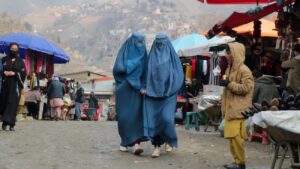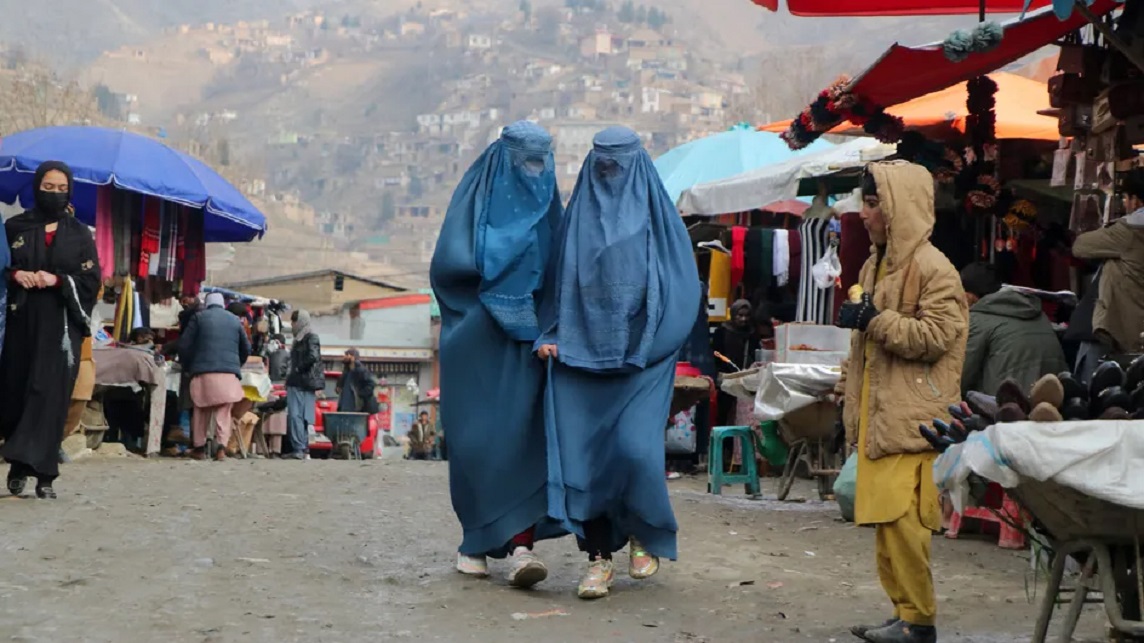Every day, the correspondents’ club describes how the same current event is illustrated in two countries. Afghan women dressed in a burka in a market in Fayzabad district, Badakhshan province, Afghanistan, January 23, 2023. (AFP)
Afghan women dressed in a burka in a market in Fayzabad district, Badakhshan province, Afghanistan, January 23, 2023. (AFP)
The erosion of women’s rights in Afghanistan and Tunisia is a growing concern. Since the Taliban took control of Afghanistan, the situation for women has worsened considerably, with their rights rapidly diminishing. In Tunisia, a country known for being one of the most progressive on the place of women in the region, women in power are less and less numerous and feminist activists are no longer as protected.
In Afghanistan, new restrictions every day
In Afghanistan, since the Taliban took power on August 15, 2021, violations of the human rights of women and girls have multiplied and progressively worsened. The Taliban had promised that they would be more flexible than during their previous regime between 1992 and 1996. Their exercise of power since they took it by force demonstrates the contrary.
One of the first rights that women have lost is that of exercising politics. Under the Afghan Republic of Afghanistan, Parliament was made up of 27.7% women. The Afghan women were present in the ministries, at the presidential palace. It is no longer anything.
The Taliban have also excluded women from many professional sectors in the name of Sharia, Islamic law. Today women are exclusively allowed to work in schools and the medical sector or at home. Secondary and higher education is also prohibited for Afghan women. For 506 days, adolescent girls have been deprived of middle and high school in Afghanistan.
Several women teachers across the country organize clandestine courses, and allow many Afghan women to continue their education, an education however at high risk and which does not lead to any diploma or official recognition. Many women work from home, some are even entrepreneurs, but they have had to register their company with the name of a male relative.
Internet allows many women to continue their professional activity at home or their trade but the economic conditions are so degraded, the electricity is inconstant and sometimes even rare and very expensive, so it is difficult to maintain an activity at home. Women are like in a trap that closes on them a little more each day, since the Taliban regularly announce new restrictions.
Less parity in Tunisia
In 1956, Habib Bourguiba established the Personal Status Code in Tunisia. It gives hitherto unprecedented rights to women in the Arab world. Polygamy is prohibited. Marriage cannot take place without the woman’s consent. Women have the same rights as men regarding divorce. The arrival of the Ennahdha party, inspired by the Muslim Brotherhood in power in the aftermath of the revolution in 2011, has not called into question its progress. But they did not progress. The coup by the President of the Republic, Kais Saied, in July 2021, worries defenders of women’s rights. The Tunisian government has been headed by a woman since the fall of 2021. However, this does not show that the country remains at the forefront on the issue of the place of women in the region.
In civil society, the voice of Tunisian feminists carries less and less. Kais Saied has never hidden his strong societal conservatism. Even if he is a fierce opponent of political Islam, the head of state shares with his enemies the same vision of the role of women. Kais Saied is opposed, for example, to equality between men and women in inheritance. However, this is one of the key battles of Tunisian feminists. The president says this would challenge the foundations of society, in which it is up to men to provide for household finances. And that it is therefore normal for a brother to receive, for example, twice as much as his sister. The Koran has laid down very strict rules on the subject. And Kais Saied refuse to touch it.
Historically a refuge for feminist activists in the region, here again Tunisia is less and less so. On Monday, the Franco-Algerian activist Amira Bouraoui was almost forcibly returned to Algeria by the Tunisian authorities. The gynecologist, sentenced to two years in prison for insulting the Prophet, had arrived in Tunisia clandestinely a few days earlier. Armed with her French passport, she had tried to embark for France from Tunis airport. But she was arrested by the police. Until recently, however, the authorities were tolerant of activists from neighboring countries. Finally, Amira Bouraoui was able to fly to Lyon thanks to the intervention of France. Civil liberties activists, however, did not fail to denounce a serious attack on Tunisia’s tradition of hospitality.
